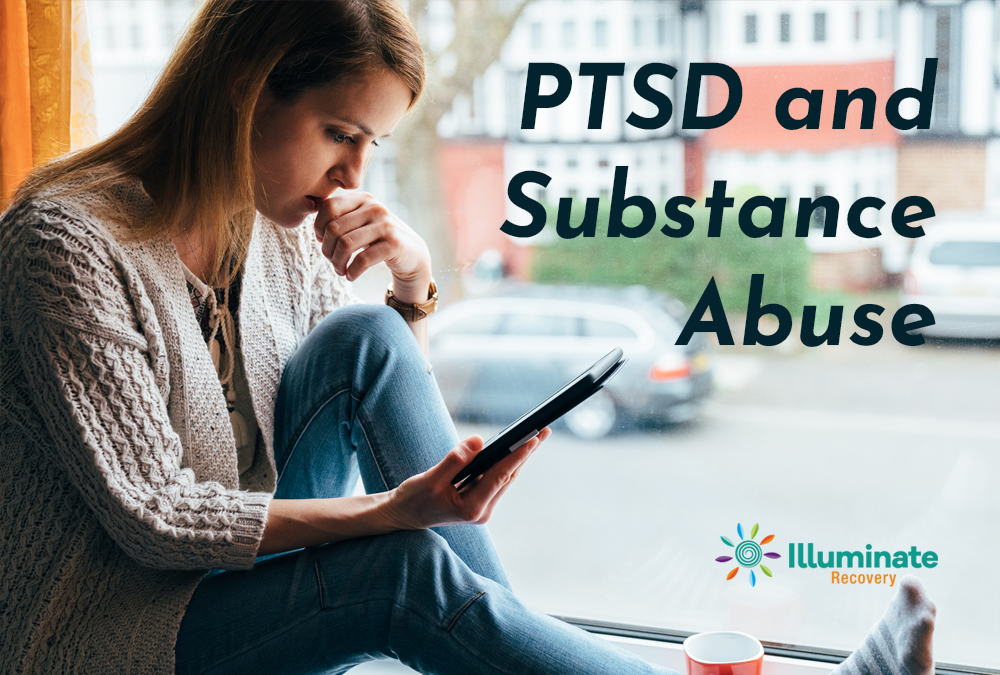While trauma is a relatively regular occurrence in American lives, the effects of post-traumatic stress disorder, or PTSD, are much less so. Only one-third of all trauma survivors experience the symptoms of PTSD, which—along with the nature of the symptoms themselves—can cause those dealing with PTSD to feel alone in their struggles. However, as more trauma survivors turn to substance use to try to quell the symptoms of PTSD, it becomes imperative that we seek to build an understanding of each—and learn how they are connected.
What is PTSD?

People experience PTSD after exposure to a traumatic event. While it is perfectly normal to feel upset, stressed, or anxious after witnessing or involvement in an emotionally distressing event, some of the most overwhelming events leave lasting impressions of fear, sadness, or helplessness. When the imprints of trauma remain within the human psyche, some individuals continue to experience overwhelming stress and anxiety, to the point of feeling helpless in the face of constantly recurring trauma.
According to the DSM-V (the Diagnostic and Statistical Manual of Mental Disorders), people experiencing PTSD have been exposed to at least one event that involved or threatened death, serious injury, or sexual violation. Instead of a minor, lingering sorrow or emotional distress, people with PTSD experience recurring, intrusive symptoms—and negative impacts on thoughts and moods that come along with them.
PTSD Symptoms and Effects Can Include:
- Recurring and intrusive memories of the traumatic event
- Recurring, traumatic dreams
- Flashbacks, where the person believes the event is happening once again
- Emotional distress or bodily reactions once the trauma resurfaces
- Negative emotions and difficulty experiencing positive ones
- Self-blame or blame of others associated with the event
- Negative feelings about self and perceived value
- Detachment from others, and loss of interest in formerly enjoyable activities
- Misremembering or failure to remember details of the traumatic event
- State of constant hyperarousal or hypervigilance
- Aggression, irritability, or destructive behavior
- Difficulty sleeping and concentrating
- Avoidance of things (people, places, feelings, sensations, and so on) that bring to mind the traumatic event
The DSM-V states that a combination of select symptoms above, experienced for more than a month after a traumatic event and significantly affecting a person’s ability to resume life, should result in a PTSD diagnosis. Also, however, the definition stresses that these symptoms are not a result of substance abuse.
What Causes PTSD?

If the symptoms of PTSD cannot be caused by substance abuse, what does cause PTSD? As stated above (as well as in the DSM-V), any traumatic event that threatens or causes death, injury, or sexual trauma can lead to PTSD. However, the question remains—why do some individuals experience PTSD after trauma while others do not?
It’s not always possible to tell why one individual develops PTSD while another does not. However, certain factors may make a person more likely to experience PTSD than others, including:
- Past exposure to trauma—especially repeated trauma, trauma that was ongoing over a long time, or trauma during childhood
- Exposure to extreme stress before, during, and after trauma
- Limited access to trauma help or resources
- Limited support from family or friends after trauma
- Possible genetic predisposition
- History of mental illness and substance use
The Link Between Trauma, PTSD, and Addiction

As mentioned, trauma is, sadly, a relatively commonplace event in our society. People of all ages and all walks of life experience trauma. While the likelihood of an individual experiencing PTSD after such an event is about 33%, the likelihood can depend on the individual, the type of trauma experienced, the severity of the event, and more. For example, while 90% of sexually abused children experience PTSD, 40% of people involved in motor vehicle accidents and 30% of Vietnam veterans experience the same.
The link between PTSD (no matter the cause) and addiction, however, is remarkably clear. People diagnosed with PTSD are, on average, three times more likely than others to use a substance, whether it be alcohol or drugs. Once PTSD has taken its toll and a person begins to seek treatment for PTSD symptoms, they are 14 times more likely to be diagnosed with a substance abuse disorder—in which the misuse of a substance begins to affect school, work, and social life negatively.
Does Trauma and PTSD Lead to Addiction?
PTSD and substance abuse, then, are considered co-occurring disorders, meaning that one co-exists alongside the other. However, it isn’t accurate to say that PTSD causes substance abuse or that substance abuse causes PTSD. A history of substance use can be a risk factor that makes a person more likely to experience PTSD after trauma. Additionally, PTSD can be a risk factor for developing a substance abuse disorder—each makes the other more likely, and when occurring together, it can exacerbate one another.
Why? Often, people experiencing the symptoms of PTSD, such as recurring, intrusive thoughts, disturbing dreams, and dissociation, wish to escape memories and triggers of the original trauma. This desire to escape and avoid is a symptom of PTSD itself and can make the possibility of repressing memories with alcohol or drugs an attractive one. Others seek to replace the rush of endorphins customarily brought on by happiness, contentment, and other positive feelings with drugs that bring about similar sensations.
Regardless of the reason, escape and endorphins are temporary and short-lived. Individuals must seek more alcohol or drugs to return to the same sensations—and as tolerance builds over time—they must use increasingly more of the substance to achieve the same effects. In this way, a person who initially depends on a substance to escape PTSD may become chemically addicted. That person will continue to need the substance long after it is clear its positive effects are no more—and may even experience PTSD symptoms and substance addiction symptoms simultaneously.
Treating PTSD and Substance Abuse
When PTSD and substance abuse co-occur, it’s crucial to address both as they are so closely linked for many individuals. Trauma and PTSD therapy should occur alongside regular addiction treatment to address all potential factors that lie behind an individual’s substance use. More than anything else, recovery from co-occurring PTSD and substance abuse demands an intricate web of support from psychiatric professionals and addiction specialists, as well as friends and family.
However, many individuals experiencing PTSD and substance abuse experience feelings of shame, guilt, or even refusal to believe or admit they are experiencing the effects of either disorder. Even if they are encouraged to seek treatment for substance abuse, these individuals may not find the support they need from a traditional rehab facility. Instead, it’s crucial to utilize a drug and alcohol treatment center that also incorporates a PTSD & trauma treatment center. Only with a comprehensive recovery plan can an individual experiencing both PTSD and substance abuse disorders find the support they need to begin recovering from both.
Seeking Integrated Treatment for Trauma and Addiction

In a PTSD and trauma treatment center, individuals can receive individualized therapies for their unique trauma and substance use triggers while also participating in group counseling sessions with others who have similar experiences. Individuals can receive medication-assisted therapies to address substance abuse, as well as treatments to lessen or cope with the effects of PTSD. Perhaps most important, individuals can learn other coping mechanisms as well as how to strengthen relationships and support networks.
Trauma therapy and addressing the symptoms of PTSD are a crucial key to PTSD recovery, and a team of professionals familiar with these co-occurring disorders is essential to effective treatment. If you or a loved one are seeking recovery from these two conditions, it’s essential to seek help from a PTSD, trauma, and substance abuse treatment center as soon as possible.
The rehab program here at Illuminate Recovery includes a special emphasis on PTSD recovery for those who are struggling with a co-occurring disorder. Please call us to find out if we can help you or your loved one with addiction and trauma recovery. Everyone deserves the care they need.

Having been on both sides of active addition, both the person using, and the person affected by a loved one using drugs and alcohol, Lucas has been involved in recovery since 2009. He has been working in the treatment industry since 2013. Using his personal experience and wealth of knowledge learned from professional development and immersion in the recovery field, he has spoken with thousands of families and helped hundreds of people attain long-term sobriety. In 2020, the opportunity presented to join in and start Illuminate Recovery. Understanding the importance of personalized treatment plans and the complex nature between substance abuse and co-occurring disorders, has helped Illuminate Recovery build a strong curriculum and a phenomenal staff. Illuminate Recovery now has a medical doctor who is board certified in addiction medicine and a psychiatric medical doctor who works side by side with independently licensed therapists to provide compassionate and effective treatment.

